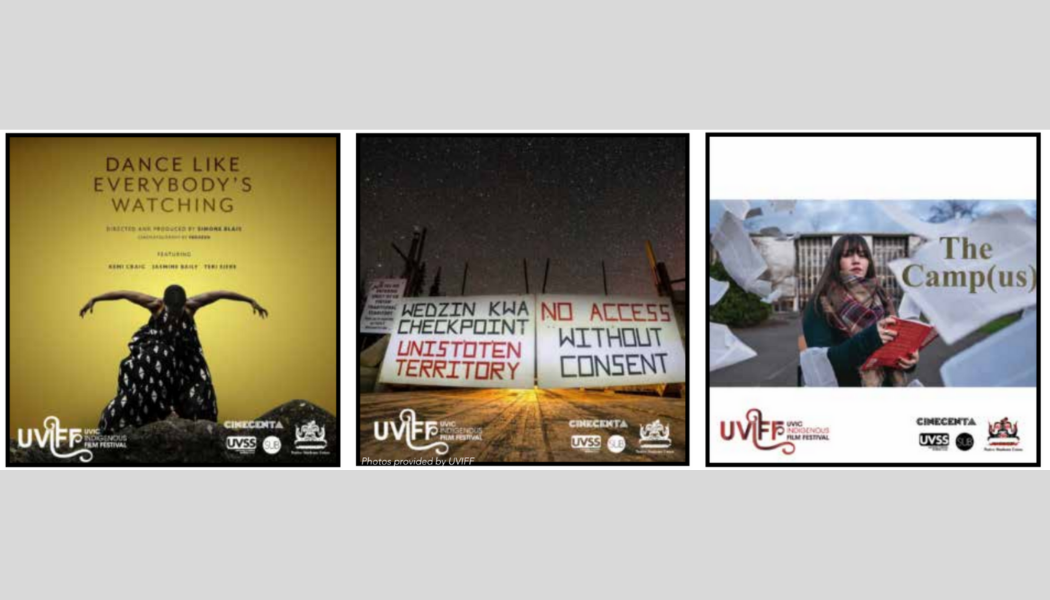The Native Students Union partnered with Cinecenta for a live screening and streaming event

On Friday, Nov. 13, the Native Students Union (NSU) and UVSS hosted their first Indigenous Film Festival live at Cinecenta and online.
The festival screened three short films made by Indigenous filmmakers while they were in their undergrad: The Camp(Us) (project lead Dhakāle or Hayle Gallup, with One Island Media), Dance Like Everybody’s Watching (dir. Simone Blais), and Colonialism in Canada: What is Happening at Unist’ot’en? (dir. Kolin Sutherland-Wilson). Two of them, Gallup and Blais, spoke at the event through Zoom.
As of Sept. 9, Cinecenta has been reopened to the public, with lots of safety protocols in place, including physical distancing for ticket and concession lines, online ticket sales, and capping their 300-seat theatre at 50 people.
The Camp(Us)
Gallup is a member of the Tahltan First Nation and was the first in her family to graduate university. She received her degree in elementary education from UVic and is currently teaching a Grade 2/3 class in her home territory.
The Camp(Us) was funded by the Telus Storyhive project, and premiered at the First Peoples House last December. It portrays three Indigenous students’ relationships to their education and culture, in reaction to, and in spite of, the residential school system.
In the film, Gallup says, “I had to get a western education in order to ensure my Indigenous reclamation.”
In the question and answer period following the film, she emphasized the juxtaposition of sacrifice and reclamation for post-secondary students. She had to leave her home territory to attend university, but sacrificed the education that she would have received there. “I am now on my reclamation journey,” she said about teaching and living in the Tahltan territory.
Dance Like Everybody’s Watching
Blais graduated this summer with a major in gender studies and a minor in Indigenous studies, where she was inspired to become a doula who specializes in caring for BIPOC childbearers over the course of their pregnancy. Her film, Dance Like Everybody’s Watching, was inspired by her participation in the Victoria dance scene. It explores the erased history of Black folks on Vancouver Island, and the appropriation of dance genres and Black culture.
“A lot of the dynamics that I was seeing in the classroom and the world at large around cultural appropriation and being the only racialized person in super white spaces and the effect that that has on people, I was kind of seeing those same dynamics play out in some ways in the dance community and in dance spaces. And it was a really interesting microcosm,” said Blais.
She contemplated doing a directed study in her final semester about the topic, but wanted her “research to be a resource that the community could have access to,” and felt that a film would be a more accessible and fun way to do that.
She took inspiration from Gallup and applied for Telus Storyhive funding in the documentary category. Her pitch video was one of 30 that was chosen out of more than 300 films to be funded, and it unofficially premiered in August at the Victoria Drive-In.
Colonialism in Canada: What Is Happening in Wet’suwet’en
Sutherland-Wilson is an Indigenous studies and environmental studies student and was the first person to protest on the legislature steps this January in response to the Wet’suwet’en hereditary chiefs’ call for a week of solidarity.
The film was created with no budget, and features footage from news networks, legal documents, historical photographs, diagrams, and more. It recounts the legal battle between the Wet’suwet’en hereditary chiefs and Coastal GasLink (CGL), who forcefully began pipeline construction this year. The hereditary chiefs have never given consent for CGL to be on their unceded territory.
UVIFF
The acronym for UVic Indigenous Film Festival (UVIFF) is a play on the Vancouver International Film Festival (VIFF), according to one of the event’s organizers, Peter Underwood.
Underwood, who is Office Coordinator at the NSU has organized “casual movie nights, but nothing like multiple films and directors speaking,” and said that simultaneously organizing a live event and an online version was difficult.
Underwood considered screening films made by Indigenous filmmakers beyond the university, but decided to keep this festival small, short, and timely. All three films were made in the last two years, and run under 25 minutes.
The NSU encourages anyone who watches these films and feels moved by what they have learned to donate to the Unist’ot’en legal fund or camp fund. According to their website, those funds “ensure that supporters on the land have food and medical supplies, that Unist’ot’en Youth are able to visit their territories, that Wet’suwet’en Elders have the necessary materials on the land to teach traditional hunting, gathering, food processing, language skills, songs, stories and more.”
Dance Like Everybody is Watching will be available soon on Blais’s forthcoming website, simone-blais.com, behind a small paywall. The Camp(Us) and Colonialism in Canada are available to view on YouTube.






